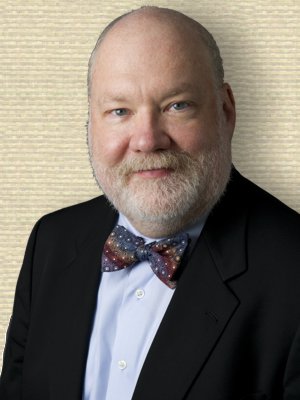 (source)
(source)
|
Gene Spafford
(1956 - )
computer scientist and writer who is a noted expert in computer security.
|
Science Quotes by Gene Spafford (14 quotes)
[For corporate computing centers:] Probably the biggest threat is people thinking that they can buy broken things and then put patches on afterward and make it secure.
— Gene Spafford
As quoted in magazine article, an interview by John McCormick, 'Computer Security as a Business Enabler', Baseline (7 Jul 2007).
A key concept is that security is an enabler, not a disabler. … Security … enables you to keep your job, security enables you to move into new markets, security enables you to have confidence in what you’re doing.
— Gene Spafford
As quoted in magazine article, an interview by John McCormick, 'Computer Security as a Business Enabler', Baseline (7 Jul 2007).
Access to more information isn’t enough—the information needs to be correct, timely, and presented in a manner that enables the reader to learn from it. The current network is full of inaccurate, misleading, and biased information that often crowds out the valid information. People have not learned that “popular” or “available” information is not necessarily valid.
— Gene Spafford
Response to the Pew Research Center survey question, “Is Google making us stupid?” Posted 19 Feb 2010 on page 'Future of the Internet IV' at pewinternet.org website.
Data is not necessarily information. Information does not necessarily lead to knowledge. And knowledge is not always sufficient to discover truth and breed wisdom.
— Gene Spafford
From post 're:The Pursuit of Knowledge, from Genesis to Google' to the 'Interesting People' List (6 Jan 2005), now archived at interesting-people.org website
Everybody using C is a dangerous thing. We have other languages that don’t have buffer overflows.
But what is the longer-term cost to us as an enterprise in increased vulnerability, increased need for add-on security services or whatever else is involved? Those kinds of questions don’t get asked often enough.
— Gene Spafford
As quoted in magazine article, an interview by John McCormick, 'Computer Security as a Business Enabler', Baseline (7 Jul 2007).
Google can aggregate all web and paper-based information, and they can build fantastic search engines, but that will not directly lead to truth or wisdom. For that we will continue to need education, training in critical thought, and good editors who can help us winnow the fact from the fiction.
— Gene Spafford
From post 're:The Pursuit of Knowledge, from Genesis to Google' to the 'Interesting People' List (6 Jan 2005) maintained by David J. Farber, now archived at interesting-people.org website.
Most writing online is devolving toward SMS and tweets that involve quick, throwaway notes with abbreviations and threaded references. This is not a form of lasting communication. In 2020 there is unlikely to be a list of classic tweets and blog posts that every student and educated citizen should have read.
— Gene Spafford
Written response to the Pew Research Center and Elon University's 'Imagining the Internet' research initiative asking their survey question (2010), “Share your view of the Internet’s influence on the future of knowledge-sharing in 2020.” From 'Imagining the Internet' on elon.edu website.
Our department is only 4 memorial services away from being excellent.
— Gene Spafford
From 'Quotable Spaf' on his faculty webpage at purdue.com with the note that “was uttered after a particularly trying week.”
Questioning the status quo can result in banishment, imprisonment, ridicule or being burned at the stake, depending on your era, your locale, and the sacred cows you wish to butcher.
— Gene Spafford
From post 're:The Pursuit of Knowledge, from Genesis to Google' to the 'Interesting People' List (6 Jan 2005) maintained by David J. Farber, now archived at interesting-people.org website.
Spaf's First Law of System Administration: If your position in an organization includes responsibility for security, but does not include corresponding authority, then your role in the organization is to take the blame when something happens. You should make sure your resume is up-to-date.
— Gene Spafford
From 'Quotable Spaf' on his faculty webpage at purdue.com.
The difference between a vision and a hallucination is how many people you can get to believe they see it, too.
— Gene Spafford
From 'Quotable Spaf' on his faculty webpage at purdue.com with note that it is his own original aphorism.
The Internet is like a herd of performing elephants with diarrhea—massive, difficult to redirect, awe-inspiring, entertaining and a source of mind-boggling amounts of excrement when you least expect it.
— Gene Spafford
Posted to a mailing list (1992), and circulated from there by some newsgroups. As authenticated in 'Quotable Spaf' on his faculty webpage at purdue.com
The only truly secure system is one that is powered off, cast in a block of concrete and sealed in a lead-lined room with armed guards—and even then I have my doubts.
— Gene Spafford
As quoted in epigraph to A.K. Dewdney, 'Computer Recreations: Of Worms, Viruses and Core War' by A. K. Dewdney in Scientific American (Mar 1989), 110. Also on the koth.org website.
There is a fine line between genius and madness—and you can achieve a lot when people are never quite sure which side of the line you’re on today.
— Gene Spafford
From 'Quotable Spaf' on his faculty webpage at purdue.com with note that it is his own original aphorism.

 In science it often happens that scientists say, 'You know that's a really good argument; my position is mistaken,' and then they would actually change their minds and you never hear that old view from them again. They really do it. It doesn't happen as often as it should, because scientists are human and change is sometimes painful. But it happens every day. I cannot recall the last time something like that happened in politics or religion.
(1987) --
In science it often happens that scientists say, 'You know that's a really good argument; my position is mistaken,' and then they would actually change their minds and you never hear that old view from them again. They really do it. It doesn't happen as often as it should, because scientists are human and change is sometimes painful. But it happens every day. I cannot recall the last time something like that happened in politics or religion.
(1987) -- 


